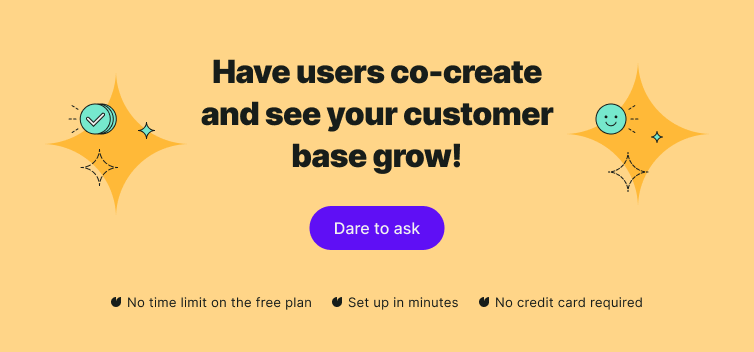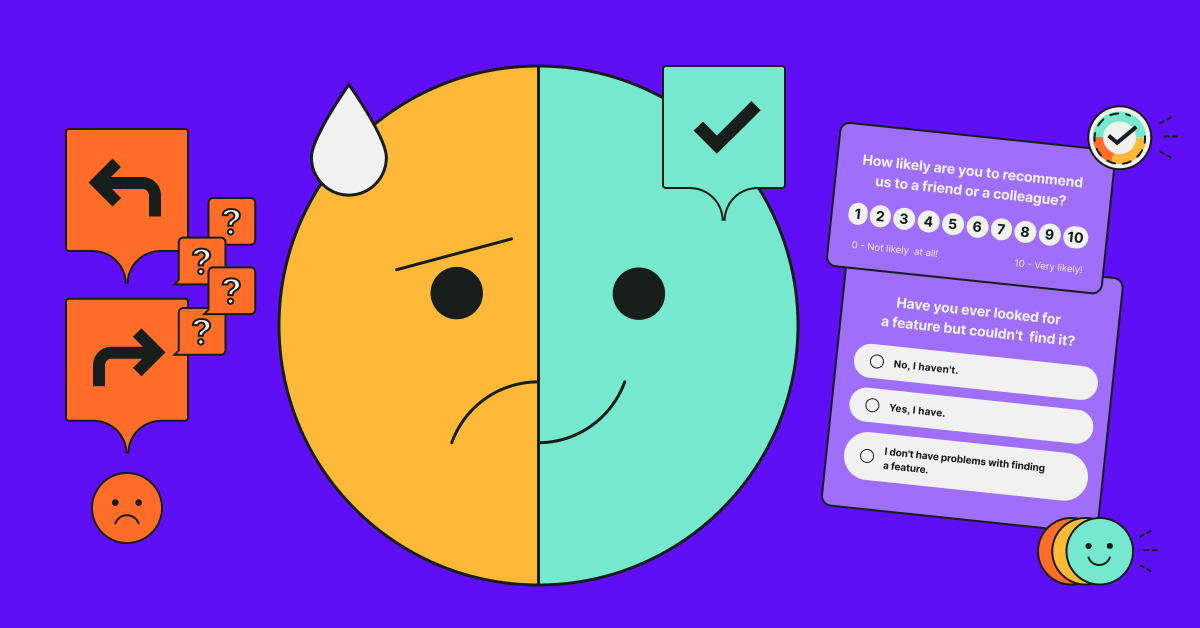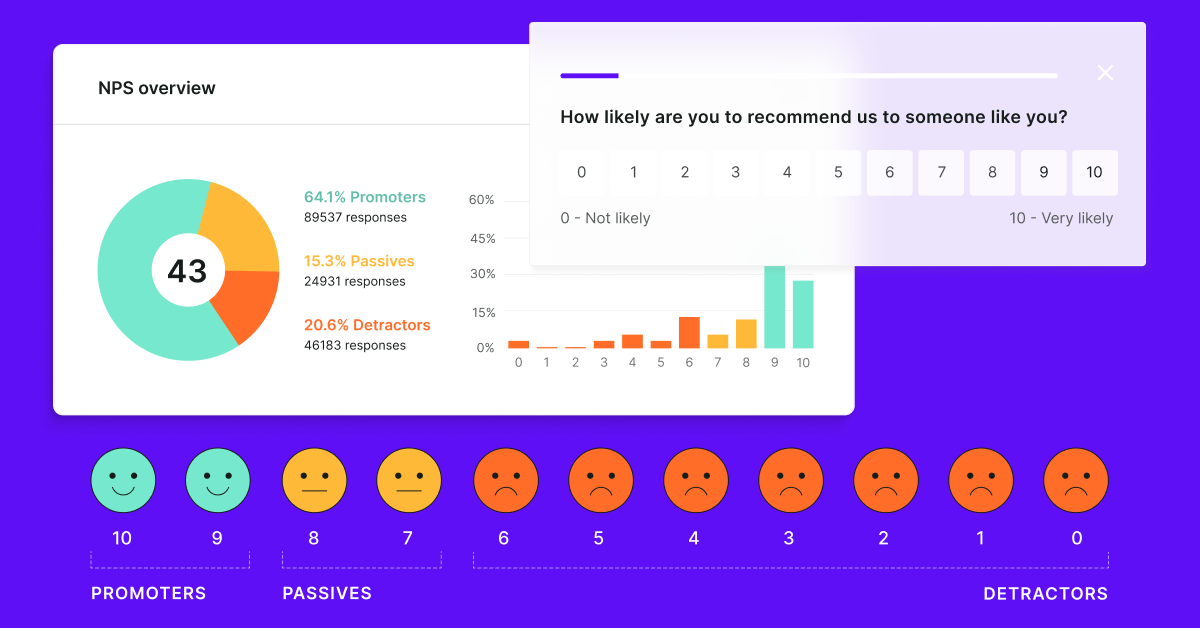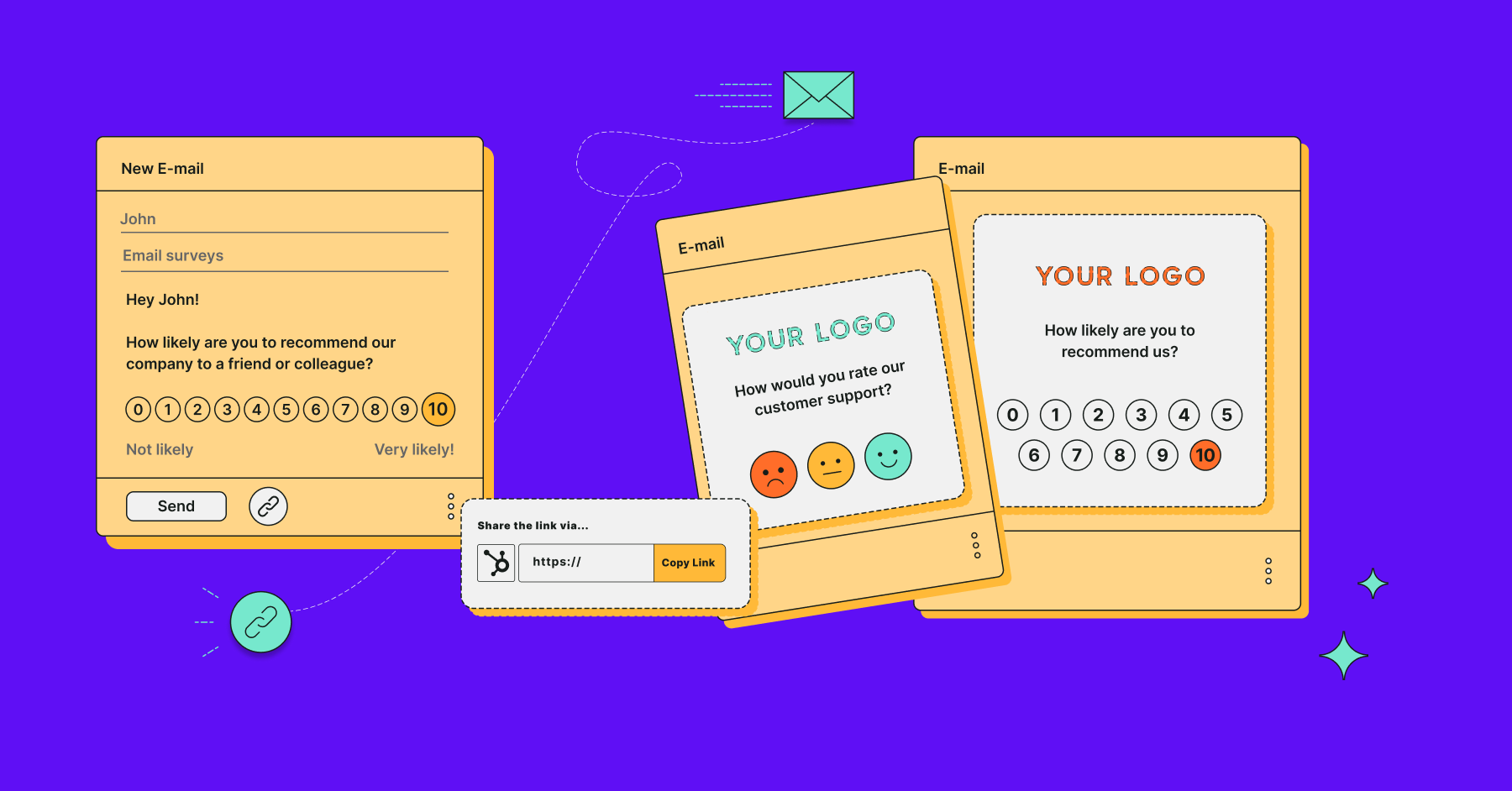As a product manager, you're always on the hook for making decisions. While some of your choices - affect only part of the picture, some influence the entire product and business.
Decision-making comes with your territory daily. You're used to it, and you like it. Making informed choices and having a say on things is what you love about the job.
You rely on data. Yet, sometimes, you lack quality data, which prevents you from making sound decisions. And, quite often, you run into information overload, verging on the brink of decision-making fatigue.
We get this.
With this blog post, we want to help you steer clear of decision fatigue. We'll walk you through a couple of surveys product managers use to collect user feedback at various stages of product development projects.
To help you process the information, we've divided them into 3 groups:
- Surveys to use pre-launch
- Surveys to run post-launch
- Surveys to turn to if you face a low user activation rate, or worse still - a high churn rate.
Some of the survey templates we cover are tried and tested by our clients, and some we've just introduced to the product. We've created them following the best practices.
Feel free to take a look and get inspired!
Surveys to get the problem/solution fit
Before you go to the market, you're looking to find a problem/solution fit - you need to find a solution to a problem and come up with ways of monetizing it. To do so, you must ensure you're addressing a real issue that can be monetized.
The following surveys will help you determine this:
1. User persona survey
The user persona survey helps you research the initial user persona and select the participants for user interviews.
Why use it?
Sending the survey before arranging user interviews will help you:
- Prepare better interviews scripts
- Recruit user interviews participants
- Hand-pick potential extreme users so that you design a potentially innovative solution
Pro tips:
- Personalize the messaging to build rapport with the respondents.
- Depending on your audience, you can also play with the microcopy of the survey template. An original, on-brand, and persona-oriented copy will help you keep the respondents engaged.
- Use a progress bar to keep respondents' motivation high.
2. Customer discovery survey
The customer discovery survey template lets you verify if the issue you want to address is a real issue people have and what the scale of the problem is. It enables you to understand better how your target group already deals with it. By doing so, you uncover your direct and indirect competitors.
Why use it?
A customer discovery survey won't do all the job of validating the issue. What it does, however, is:
- Provide you with quantitative data that will reduce uncertainty at the onset of the project
- Spare you from wasting time and resources going in the wrong direction
- Give a new, exciting direction to the entire project or uncover a new way of looking at a problem
- Help you hone marketing massaging
- Provide arguments to gain buy-ins from investors
Pro tips:
- Speak your personas’ language in the surveys.
- Watch out for leading questions.
- Leave out the sensitive issues for later - tackle them in the customer discovery interviews.
- During the customer discovery interviews, dig deep with questions about interviewees’ whys.
3. Product’s value proposition validation survey
The value proposition validation survey template is a template we created based on Strategyzer's best practices, as described in their "Testing Business Ideas" book.
Why use the survey?
Send this survey template to validate how you prioritized the jobs, pains, and gains in your Unique Value Proposition Canvas. By doing so, you'll be able to reduce guesswork and make sure you focus on the areas that are most lucrative.
Pro tips:
We cannot think of any apart from the survey sample size. It's a quantitative survey - take that into account!
Product surveys to perfect the UX of your MVP
Now that you're close to bringing the product to the market ensure the product's user experience does not get in the way of finding the product/market fit. The following product feedback survey templates can help you get your prototypes right:
4. System Usability Scale survey
User experience has a direct impact on your app's ROI. It's pretty simple: Good UX leads to better user engagement and higher conversion rates. Poor user experience contributes to user churn.
The System Usability Scale is a usability testing survey that is a part of every UX researcher's toolkit.
It's easy to use. It's a good practice to use this product survey as it is, so don't change its content. Otherwise, it may be difficult for you to calculate the SUS score.
Why is the survey useful?
It lets you collect product feedback at scale, which is vital as it helps you know which piece of feedback is essential and should be acted on.
If you use the survey while testing prototypes, it'll be a real cost saver as you'll be able to identify the areas for improvement before development.
Feel free to check the SUS survey template out. (No strings attached!):
5. Single Ease Question
It's another standard product survey to collect user feedback during usability testing.
Trigger it after every task a test participant completed. The survey will let you understand how easy or difficult it is for users to perform actions in your app.
Why is the survey useful?
It's a quick and hassle-free way to discover potential glitches and prioritize the fixes.
Check out the SEQ survey template below:
A pro tip:
According to Norman Nielsen, this SEQ survey gives you the best results if it’s a 7-point scale survey. Don’t change the scale.
Once you roll out: A new product evaluation surveys
6. Product testing survey
The product feedback survey is one of our top performers. The product testing survey template is our users' 3rd most popular product survey. It asks about users' general satisfaction with a product. Depending on your needs, you can add more questions to the survey.
Here are some other new product survey question examples:
- How valuable would it be if you could do X with our app?
- Would $250/month be a fair price for doing X?
- What additional features would you like to see in the future?
- What changes to our product would encourage you to use our product more frequently?
Why is it useful?
Product research surveys help you design user-centered products. They are particularly important when you’re developing a new product. The product decisions you make in the first months can make or break business.
7. Product-market fit survey
Product-Market Fit surveys are another top performer of ours. Collecting customer feedback with a survey is standard practice when looking for a product-market fit. Survicate's product-market fit survey template helps you discover the key benefits people get from your product so you can build products people love.
Why use it?
It goes without saying that achieving product-market fit is crucial for the success of your startup. Not only does it guarantee you your digital product will take off, great product-market fit means fast sales and low customer acquisition costs (as user recommendations pour in).
Yet success is never a result of brilliant product ideas. Even the best, the most disruptive ideas, have to be tested and fine-tuned. Adjusting the initial concept to the actual market needs takes iterations and research.
Product market-fit surveys are standard product feedback surveys used when developing MVPs. Check the template out! ↓
8. Product feature prioritization survey
Henry Ford famously said: "If I had asked people what they wanted, they would have said faster horses."
At Survicate, we strongly believe in the importance of collecting feedback, so we're saying: "It depends." 😎
Not to diminish this great inventor's innovation, but if he asked people the right way, the plane might have been invented much earlier, or humankind would long have driven Teslas! 🔌 😉
Our product feature prioritization survey template helps you ask product questions the smart way. It involves your user base in the product roadmap prioritization process.
Why have users prioritize?
One way of deciding on product feature priority is by looking at how many times a feature was requested only. It's a one way of planning the roadmap.
But, there are also other ways.
To quote a renowned organizational psychologist, Adam Grant:

The feedback your customers volunteer in communication channels is a sure sign a feature is needed. But does the frequency of a request prove the feature is your priority? It doesn't.
The fact that a feature hasn't been requested voluntarily by a large portion of users doesn't mean it's not a lucrative feature users would appreciate. The only thing their silence says is that they haven't voiced their need. Were they too busy analyzing your competitive landscape? Hopefully, not!
Making sound decisions takes proactivity in collecting user feedback.
By sending a product survey to a larger portion of your customer base, you'll ensure the right sample sizes and better quality data.
You'll also be able to segment the feedback to draw better conclusions from the data. You'll be able to compare the feature choices customers from higher pricing tiers make to those made by less profitable customers.
A pro tip:
Divide your user base into segments before distributing the survey, and make sure one of the segments is made up of your best users. This way, you'll be able to prioritize feature requests better. You'll also augment your understanding of your personas' needs.
9. User activation survey
Our user activation survey template investigates why users underuse a product. It asks questions about the ease of use, comprehensiveness of features, and the extent to which a product is helpful.
Why use this product evaluation survey?
User activation is one of the most important metrics telling the success of your product. Since it has direct correlation with high conversion rates and ROI, it's in your best interest to keep it high.
A pro tip:
For best results, segment the target audience into user personas. By doing so, you'll be able to draw more actionable insights and design more effective user activation strategies.
💡YOU MAY ALSO BE INTERESTED IN: User activation metrics survey template
10. The lost customer survey
Churn is the final cry of a dissatisfied customer. While sometimes, users churn as they never intended to use your product in the long term. Sometimes, they go because of the shortcomings of your digital offering.
Just like customers have reasons to go, you have grounds to want to understand why.
Why use the survey?
Knowing the reasons for churn and the proportions of them will help you adjust your product/business strategy:
If a large portion of users leave you because the need for your tool was project-related, it may be worth looking for a new market niche. (In other words, looking for a better product/market fit.)
If they leave for other reasons, collect feedback and act on it. You'll be able to fix the leak soon.
Examples of product survey questions for a churn reasons survey:
- What is the primary reason for canceling your subscription?
- What were your expectations that we couldn't meet?
- What was your primary motivation to register with X?
- What alternative did you find?
A pro tip:
As a pro tip, we recommended a read ;) : How to Fight With Customer Churn
Best of luck! 🤞🏼🦾🚀
💡 YOU MAY ALSO BE INTERESTED IN: Product research survey templates library
Evergreens - the must-have product surveys
11. Net Promoter Score survey
Net Promoter Score surveys are our number one surveys. They are the most popular surveys our customers use. It doesn't come as a surprise. NPS surveys are easy to implement and receive high response rates.
NPS surveys help you determine how likely your customers are to recommend your product, which reveals customer loyalty levels and the overall health of a business. They also come with open-ended questions that let you identify product issues to fix them and avoid churn.
Why use them?
NPS lets you identify churn risks - those include both passives and detractors. By engaging with these customers and looking into the issues they report, you can increase your user activation rates.
On top of that, collecting NPS feedback is an easy way to identify your happiest customer. Why not leverage them by encouraging them to promote your app in an app store or any other product review platforms? This way you not only increase the customer lifetime value (CTV), you also reduce customer acquisition costs.
Pro tips:
- To get the most value from the NPS surveys, trigger them regularly and compare results with industry NPS benchmarks or your past results.
- Consider the entire user journey when you decide when and where to display them.
- It's a common misconception that passives can be overlooked. Remember - NPS passives are often as likely to churn as detractors - pay attention to them.
RECOMMENDED READING:
- What is Net Promoter Score? 2022 Guide to Top NPS Survey
- 7 Simple Steps to Launching a Successful NPS Campaign
12. Customer Satisfaction Survey (CSAT)
Next up are CSAT surveys - our forerunners.
CSAT is a simple but powerful method to measure customer satisfaction. Whenever customers engage with your product, it's worth sending them a CSAT survey. This lets you check if your customers face any product issues and fix them head-on.
Why it's useful?
CSAT is interaction-based, meaning you measure customer satisfaction at a specific touchpoint (like using a new feature). Also, you can improve the user experience based on CSAT scores by finding out what issues your customers are facing.
13. Customer Effort Score survey (CES)
CES (Customer Effort Score) surveys are our 5th most popular product surveys. CES measures the ease of doing business with your company or performing specific tasks in your product.
CES product survey questions include:
- How easy do you find building surveys with the new survey builder?
- How clear is the action you can take based on what you're seeing?
- How easy was it for you to get started with X?
Why is a CES survey useful?
The multitude of technology at hand changed the market demands. Consumers now expect technology to enable achieving their goals. They expect things to be easy and happen fast.
To keep churn rates low and customer satisfaction high, ease of use and speed are essential qualities you, as a product manager, should strive to ensure.
And with a CES survey you can achieve exactly that - find ways to eliminate friction and make the user journey smooth.
A pro tip:
Trigger the survey in the pivotal moments in the user journey - after users perform important actions.
The CES survey closes our list of the most helpful product feedback surveys with the potential to ease your decision fatigue. We hope you've found it useful.
If yes - pick a template, sign up, and … ↓


.webp)






.svg)
.svg)
.svg)

.svg)


.svg)







.svg)




.svg)

















.svg)






























.svg)

.svg)
.svg)

.svg)



.svg)






.svg)

.svg)


.png)





